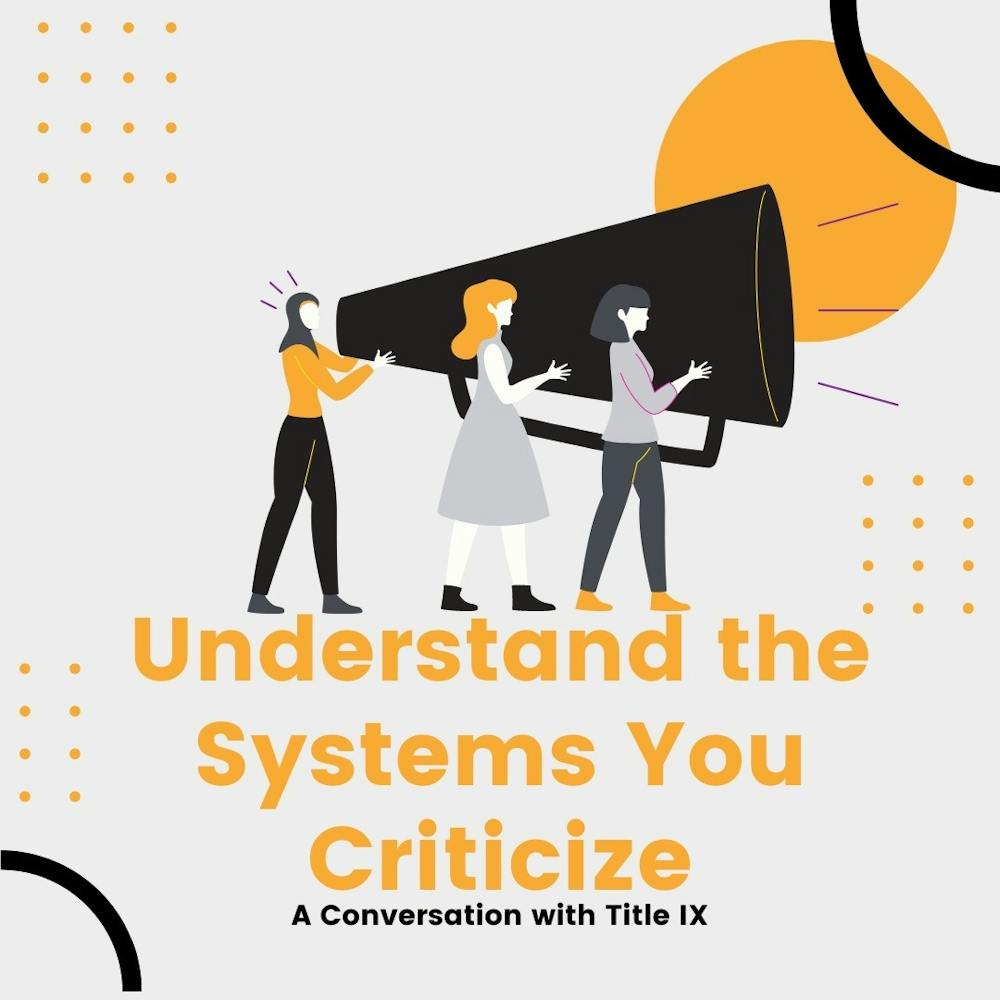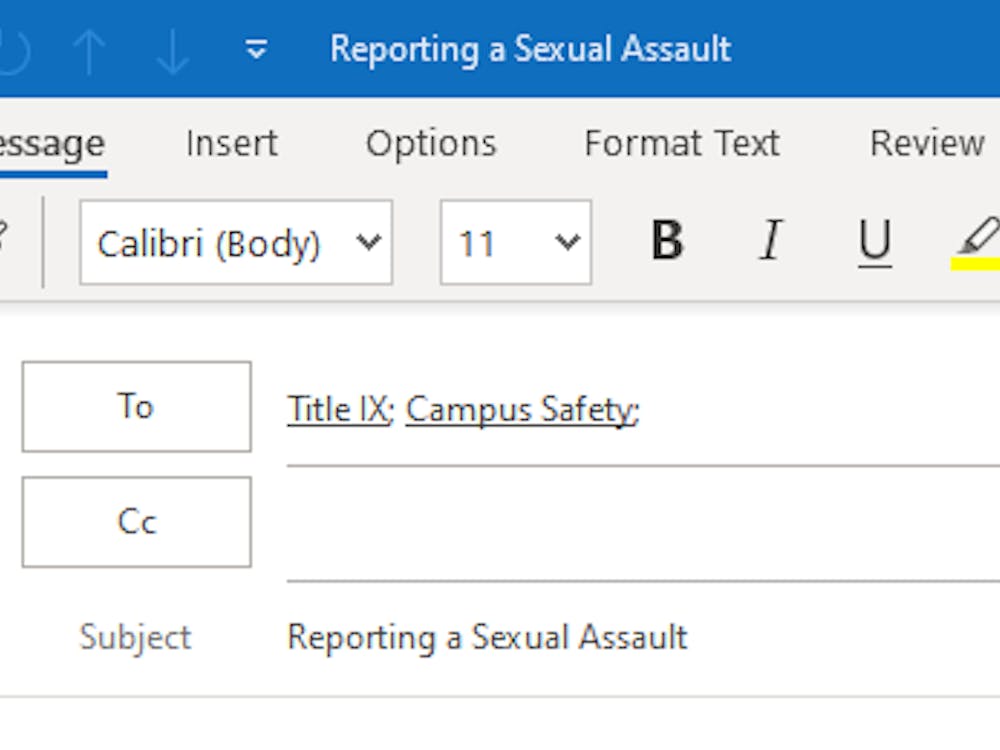As student representatives, some of the main grievances shared with us as constituency reports are comments, questions, or concerns about Title IX on campus. After SASA's Fall Week of Action, the student body’s relationship with Title IX had been somewhat severed after the infamous filing cabinet revealed testimonies about experiences with Title IX. It is noted that these testimonies were several years old and predated the current Title IX team. We sat down with Title IX to talk about what steps we could take to rebuild the relationship between students at UP and the Title IX team.
As student leaders, we wanted to find a way for Title IX to respond or take accountability for these grievances. Title IX is not allowed to comment on specific cases for privacy and protection of their cases, however we sat down with the Title IX team (Meg Farra, Emma Ahern, James Peña, Tammy Herdener and Ann James) to ask frequently asked questions from students and find accurate information about the Title IX process amidst all the misinformation.
In order to be critics of a system, it is essential to have a proper understanding of it first. We hope this piece gives you a bit more understanding of Title IX so that we can all be better activists in the future.
We had questions submitted by students and SASA. The answers below are paraphrased from the answers given during our meeting.
Q: Reports are made every 2 years to quantify data. Where are the reports available?
A: Meg Farra worked with Sandy Chung in her role as Title IX Coordinator to create quantified data reports that can be presented every two years. They choose a two-year period to ensure anonymity and not compromise anyone’s right to privacy. However, there is no quantified data before 2018 available, as the current Title IX team does not want to quantify data they were not present for the collection of. Attached is a memorandum with data focusing on incidents reported as sexual harassment or sexual misconduct from 2018 to 2020.
Q: What are the statistics of outcomes when a person is deemed responsible for sexual assault? (i.e. how many cases result in suspensions, expulsions, no action, etc?)
A: Of the 95 reported cases of sexual harassment or misconduct in the last memorandum, 13 were fully investigated. Of the 13 cases fully investigated, there was 1 suspension, 9 dismissals (expulsion), and 2 resolutions. Reported cases may not be formally investigated for a variety of reasons, including that a reporting party may choose not to have an investigation or may choose to stop their participation at any time. A large percentage of cases went uninvestigated because reporting parties have the choice to stop the investigation at any point. In addition, some people choose to not have an investigation at all. So, the 13 cases aforementioned are reflective of investigations that were completed. Title IX respects the reporting party's decision provided there isn’t a larger safety concern for the community. Just because something is reported to them, doesn’t mean it will end in an investigation and that there are other options, resources, and accommodations that are available to them.
The Title IX team stated that the next memorandum is still in the process of being compiled and they are considering postponing the publication of the memorandum in order to protect the anonymity of the reports due to the lack of reports during the school year of 2020-2021 because of COVID and remote learning. They want to protect people’s privacy, but also want to share it to be transparent. A decision will not be made until likely this summer.
Q: How are Title IX staff trained? Ie. mandatory reports / confidential reports?
A: HB 3415 is a bill that created requirements for institutional policies related to sexual assault, sexual harassment, stalking, dating violence, and domestic violence. According to HB 3415, those who are trained should include Title IX Coordinators, Hearing Officers, Process Advisors, Investigators, Third-party contract investigators, Campus Security Officers, and anyone else who may assist with an investigation. UP has chosen to use a training module from an Oregon company, TIXEdu, for this training requirement to be in compliance with HB 3415. Other trainees include senior hall staff and hall directors. The Title IX team also offers one-on-ones with RAs and other student leaders who want help. Furthermore, new staff among others are expected to complete a Title IX training, and additional training is required for other positions, including Title IX Coordinator.
Q: In what ways do you think you can improve your connection to the student body?
A: The Title IX team wants the student body to know that they are always available to meet and students can be involved with their team. If students would like to have a direct impact on Title IX, join the advisory committee! The committee meets on the first Friday of every month and is open to anyone on campus.
Q: What flaws do you see in UPs Title IX that needs to be addressed?
A: Ideally, prevention and education would be enough for harm to not occur in our community. However, the Title IX team acknowledges that more needs to be done. Title IX is a program that was built to provide equity and justice but this is often hard to achieve given the matters that Title IX deals with. The gravity of sexual assault and harassment can impede on the success of the reporting party feeling a sense of justice or equity. The Title IX team also acknowledges that the work for Title IX is demanding, and similar to students and faculty, the team can feel burnout from their work. Students are always Meg's top priority and focus in her role, despite having two positions on campus. The hope is that the future TIX Coordinator will be able to focus solely on Title IX and provide even greater and broader focus on Title IX matters.
Q: What resources are provided to victims?
A: Title IX has a resource page here that is available to students. In addition, SASA has resources available here. SASA has been advocating for a third-party advocate for a while now, and this position has since been approved.
Q: If someone were to submit a report of sexual assault, what are the steps Title IX would take?
A: Chiara Profenna wrote a comprehensive article about the Title IX process in December of 2021. There is also a flow sheet of how Title IX will deal with reports on their website.
Q: Why is the process so long?
A: The process can be quite long since the coordination between the reporting party, responding party, and all those involved can cause long waits before meetings can occur. The process can also include witness names given by both parties. In order to be as thorough as possible, investigations would include as much relevant information as possible which often takes time to acquire, especially considering that parties are often students and have busy schedules. Law and policy drive the timeline of the processes that Title IX facilitates, and it asks that a very personal experience fit in a very administrative process, which can feel impersonal and frustrating.
Q: Is there any other important info for us to know?
A: The team wants to emphasize that making a report does not always equal an investigation. Someone can report an incident, give no details and still receive support from the resources that Title IX offers, such as changes in housing, academic accommodations, counseling, and more. Students can be as vague as they’d like and ask for support without sharing explicit information. If you’d also like to get your questions answered without having to file a report, you could ask hypothetical questions. James is also a confidential resource who can ask questions on the Title IX team’s behalf.
Follow Title IX on Instagram! They post when the advisory committee is meeting and important information in an easy-to-understand way.
Students, we understand your frustration with Title IX. We don’t think that Title IX is a perfect system. However, we do recognize that the people who work at UP for Title IX are good people who work hard to support and provide information for students. It is essential that we try our best to understand Title IX and try not to spread misinformation.
It would be easy for us to write an article talking about how horrible Title IX is and the trauma that they have caused students — we are sure that such a piece would be more popular among students. However, if we want to critically analyze any institution, it is important that we understand it first. So, in order to be better advocates for victims and survivors in the future, it is essential to have a greater understanding of Title IX and the support it can provide for students. We urge you all to try to understand the systems that you don’t agree with in the future. We are sure you will become better advocates because of this.
Angela Wipfler is a junior at UP. She can be reached at wipfler23@up.edu.
Beth Chvilicek is a junior at UP. They can be reached at chvilice23@up.edu.
Have something to say about this? We’re dedicated to publishing a wide variety of viewpoints, and we’d like to hear from you. Voice your opinion in The Beacon.








